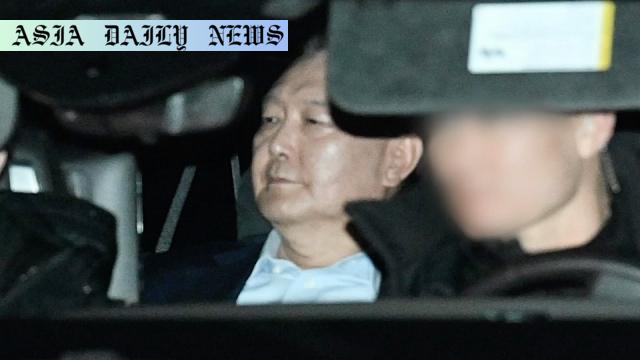Yoon Suk-yeol is set to attend the Constitutional Court hearing on his impeachment trial while facing allegations of insurrection.

Introduction to Yoon’s Impeachment Trial
South Korean President Yoon Suk-yeol finds himself at the center of a pivotal legal and political battle following his impeachment motion passed by the National Assembly in December. The Constitutional Court is now tasked with determining whether Yoon’s impeachment will be upheld. As part of this process, Yoon’s defense team has confirmed that he will personally attend the third hearing, scheduled for Tuesday. This development underscores the gravity of the situation, marking a significant moment in South Korea’s political history.
The Charges Against President Yoon
President Yoon’s legal troubles extend beyond impeachment. On Sunday, he was arrested on allegations of orchestrating an insurrection, a charge that has stirred intense debate across the country. According to prosecutors, Yoon is suspected of attempting to use unconstitutional means to consolidate his power—a claim he vehemently denies. This allegation has further divided public opinion, as some citizens support the investigation while others view it as politically motivated.
Constitutional Court’s Role and Upcoming Hearing
The Constitutional Court plays a crucial role in this unfolding drama. Its decision on Yoon’s impeachment will either affirm the National Assembly’s motion or reinstate him as president. This marks the third hearing in the ongoing trial, and Yoon’s decision to attend highlights both the significance of the case and his desire to address the court directly. The court’s ruling will have lasting implications for South Korea’s political landscape.
Public and Political Reactions
The impeachment trial and the insurrection allegations have triggered mixed reactions across South Korea. Political experts note that this case could set a precedent for how similar allegations are handled in the future. While members of the opposition party have rallied for Yoon’s removal, his supporters argue that the charges lack sufficient evidence and reflect partisanship in law enforcement. Many citizens initially skeptical of impeachment now wait anxiously for the court’s decision.
Investigation Challenges and Next Steps
Despite attempts by a joint team of investigators to question President Yoon, he has so far refused to cooperate, citing the legal and political complications posed by the ongoing trial. On Monday, investigators sent personnel to bring him in for questioning but were unable to proceed due to his refusal. Authorities have expressed their commitment to continuing the investigation and pursuing questioning at a later date. Yoon’s resistance has fueled speculation about the strength of their evidence and the motivations behind the charges.
The Wider Implications for South Korea
The impeachment trial and associated allegations are a moment of national reckoning for South Korea. Questions about constitutional accountability, the integrity of political institutions, and the limits of presidential power have taken center stage. Observers believe that a fair and transparent trial is essential to maintain public trust in the nation’s democratic tools. The outcome has the potential to reshape political alliances and influence upcoming elections.
Conclusion
As President Yoon prepares to attend the Constitutional Court’s third impeachment hearing, the nation finds itself at a critical juncture. The charges against him, both constitutional and criminal, pose significant challenges for the presidency and South Korean democracy at large. Regardless of the final verdict, this trial underscores the importance of accountability and rule of law in governance. The world watches as South Korea navigates this unprecedented political crisis.
Commentary
Significance of Yoon’s Attendance
President Yoon’s decision to attend the impeachment hearing is a striking move that demonstrates his commitment to defending his position personally. This choice highlights the weight of the situation—not just for his leadership but also for the nation he represents. By addressing the court in person, Yoon aims to sway public opinion and show accountability, even as allegations of criminal misconduct loom large over him. It is critical for leaders to face accusations head-on, and Yoon’s attendance exemplifies this principle.
The Broader Political Climate
This trial unfolds against a backdrop of a polarized political environment in South Korea. Yoon’s impeachment and the controversial charges of insurrection have thrown the country’s judiciary and legislature into the spotlight. It raises questions about the separation of powers and the impartiality of investigative bodies. Are these accusations grounded in justice, or are they an outcome of political rivalries? These are questions that every South Korean citizen is pondering at the moment.
Implications for South Korea’s Democracy
The Yoon impeachment trial could become a landmark case for South Korea’s democracy. How the court handles this matter will showcase the strength of the country’s institutions and their ability to function independently. It’s also an opportunity for South Korea to demonstrate its commitment to transparency and accountability, especially to the global community. At the same time, a rushed or overly politicized process could do lasting harm. The outcome must be seen as just and fair by all sides for the nation to heal and move forward.
Ultimately, the trial of President Yoon Suk-yeol is more than just a legal proceeding; it is a test of the nation’s values, unity, and resilience. The decisions made in the coming weeks will resonate far beyond this moment.


